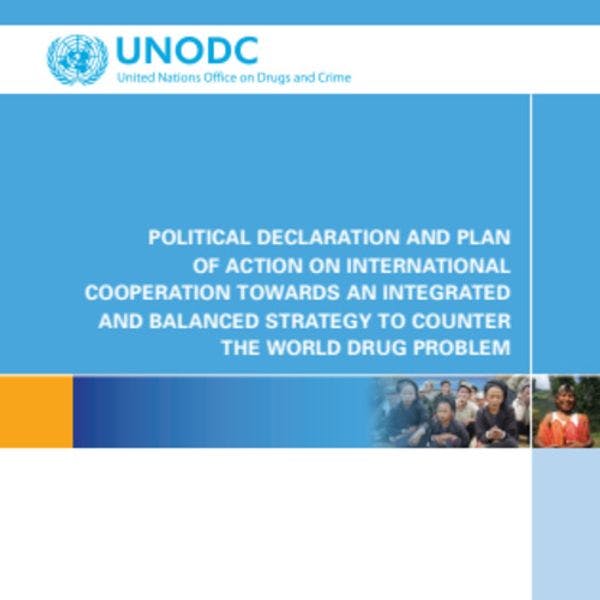Business as usual for governments at the UN as drugs hit record levels
14 March 2019, VIENNA – The International Drug Policy Consortium expresses disappointment following the UN’s adoption of a 10-year global drug strategy that fails to deal with the realities and the devastating impacts of punitive drug policies.
Today, the United Nations (UN) agreed to a new framework for global drug control: a Ministerial Declaration aimed at accelerating ‘the implementation of our joint commitments to address and counter the world drug problem’ for the next decade. In its statement released today on behalf of its 180+ NGO members, IDPC states that the new global agreement on drugs reiterates the failed trajectory of global drug control of the past 20 years, which aims to achieve a drug-free world. In the face of record increases in the scale of the illicit drug market such a goal is both unrealistic and increasingly irrelevant.
Governments the world over have utterly failed to make any progress in achieving a drug-free world. Over the past decade, there has been a 31% increase in the number of people who use drugs, and an unprecedented rise in the cultivation of opium and coca. Organised crime has also flourished, with the illicit drug trade estimated to now be worth between USD 426 to 652 billion.
In blindly striving for a drug-free world, drug policies have had devastating consequences:
- Half a million preventable deaths by overdoses and from HIV, hepatitis C and tuberculosis in 2015 alone
- A global epidemic of pain which has left 75% of the world’s population without access to pain relief, and
- Severe human rights violations, including mass incarceration, 3,940 executions, and tens of thousands of extrajudicial and other unlawful killings.
The negotiations on the new strategy were clearly fraught, given the increasing polarisation of governments with some countries moving towards cannabis regulation while others ramp up their ‘war on drugs’ approaches. Some progressive countries would have fought hard for stronger references to human rights, and against restating pointless ‘drug-free world’ goals that have plagued UN drug policy documents for decades. Unfortunately, the so-called ‘Vienna consensus’ won out and has once again stifled progress in UN drug policy.
Even though the document includes a bleak acknowledgement of the scale of the problem, it re-commits the international community to another decade focusing on the elimination of the illicit drug market. The achievement of new commitments to improve access to medicines such as morphine for pain relief, or to reduce incarceration through the use of alternatives, will be hindered by the overarching goal of striving for a drug-free world.
In contrast to the close-minded government debate, today a UN inter-agency task team released a report on lessons learned from the UN system which states, ‘Punitive drug policies continue to be used in some communities, despite being ineffective in reducing drug trafficking or in addressing non-medical drug use and supply, and continue to undermine the human rights and well-being of persons who use drugs, as well as of their families and communities.’
Ann Fordham, IDPC Executive Director, said: “Although some progress has been made in the new Declaration compared to ten years ago, it is disappointing that governments cannot be honest about how repressive drug policies drive devastating harms, more so than the drugs themselves. The consensus-based UN drugs debate has led to the unfortunate recycling of failed and flawed rhetoric that must be called out. Governments would do well to reflect on the evidence before them from the UN system as well as civil society.”
***********
NOTES TO THE EDITOR
Key links and information:
- The International Drug Policy Consortiumis a global network of 180+ NGOs that come together to promote an objective and open debate on national and international drug policies, and supports evidence-based policies that are effective at reducing harms. More information.
- The IDPC statement is available here.
- The 2019 UN Ministerial Declaration is available here.
- ‘What we have learned over the last ten years: A summary of knowledge acquired and produced by the UN system on drug-related matters’– a contribution published on 14 March 2019 from UN system coordination Task Team on the Implementation of the UN System Common Position on drug-related matters is available here.
- ‘Taking stock: A decade of drug policy – A civil society shadow report’is available here.
- 2009 Political Declaration and Plan of Action: global drug strategy adopted at the United Nations in Vienna which set out to eradicate or significantly reduce the illegal drug market by 2019. The full text is available here.
***********
FOR FURTHER INFORMATION, PLEASE CONTACT:
Ann Fordham
Executive Director
International Drug Policy Consortium
+44 79 7003 4810
afordham@idpc.net
Marie Nougier
Head of Research and Communications
International Drug Policy Consortium
+44 78 0707 7617
mnougier@idpc.net
